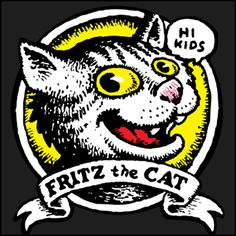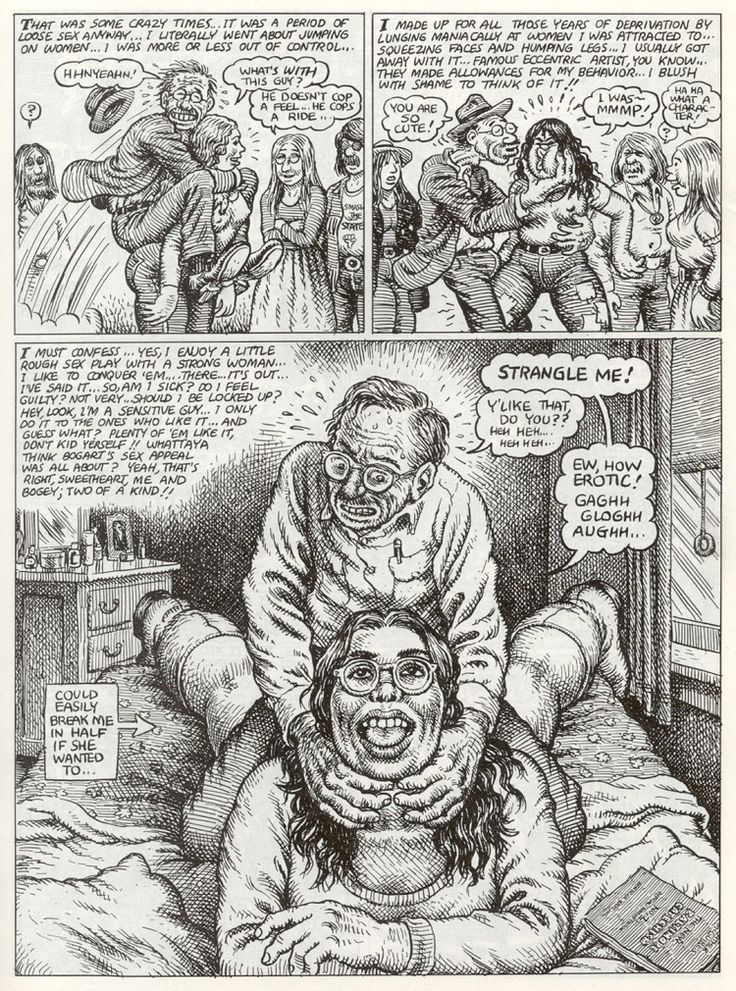American
illustrator and artist Robert Crumb is best known for his distinctive
style and satirical tone and creating the cartoon character Fritz the
Cat.
Controversial
American cartoonist Robert Crumb is widely considered to be the "father
of underground comics." His work has a distinctive style and satirical
tone and often features strongly stereotyped portrayals of minorities
and overly sexualized women. He is best known for creating the cartoon
characters Fritz the Cat, Mr. Natural and Devil Girl.
Cartoonist
Robert Crumb was born on August 30, 1943, in Philadelphia,
Pennsylvania. Talented and perverse, Crumb first entered the public eye
as an underground cartoonist during the late 1960s as the creator of Zap Comix. He created such characters as Fritz the Cat, Angelfood McSpade and Mr. Natural.
One
of five children, Crumb had a difficult time growing up. His father, a
member of the U.S. marines, was physically and verbally abusive, and
his mother had psychological problems. Crumb was closest to his older
brother Charles who was fascinated by comics and Walt Disney. The two
brothers spent much of their time together creating their own comics.
For years, the Crumb family moved around for his father's military career. Wherever he went, Robert Crumb had a hard time fitting in. "I was passive, mushy and vague when I was a kid," Crumb explained in The R. Crumb Handbook. After his father retired from the service in 1956, the Crumb family moved to Delaware. Throughout their childhoods, the Crumb children attended Catholic school. Robert was devoted to his faith until around the age of 16. In high school, he was treated like a social outcast.
In
1962, Crumb moved to Cleveland where he found a job at the American
Greetings Corporation. He first worked as a color separator before
getting promoted to an illustrator position. According to his website,
Crumb's boss often told him that his drawings were "too grotesque."
Crumb
married Dana Morgan in 1964. By the next June, Crumb started
experimenting with the drug LSD, which had a dramatic impact on his
art. Some of his most famous characters, including Mr. Natural, The
Snoid, Shuman the Human and the Truckin' guys, surfaced his drawings
from this period. Crumb soon started contributing to a number of
underground newspapers.
He moved to San Francisco in 1967, which had a growing underground hippie music and art scene. The first issue of Zap Comix
came out in 1968—the same year he and his wife welcomed a son named
Jesse. Around this time, Crumb created his famous cover art for Big
Brother and the Holding Company's Cheap Thrills, which featured several drawings of lead singer Janis Joplin.
Some
of Crumb's work involved social satire. He took on the establishment
with such characters as Whiteman, an uptight businessman. Mr. Natural
was a so-called mystic who was really a con man. With Fritz the Cat, a
character he had invented as a child, Crumb poked fun at bohemian
types. The adventures of slick, female-chasing feline appeared in
several magazines and comic books and in book form in 1969.
Sex
was another important part of his work. He explored his own sexual
fantasies through his comics and shared his preferred style of female
figure—thick-legged Amazonian women with ample bumps and curves. One
comic cover featured the tagline "What do those hippy chicks do when
they do their thing?" Some felt that Crumb's work demeaned women, and
others found his comics obscene.
In 1972, Crumb decided to kill off his most famous creation after being upset with the X-rated film adaptation by Ralph Bakshi, Fritz the Cat, which was released that year. The hipster cat was murdered by old girlfriend in his final comic book appearance.
Crumb
was also disturbed how the popular culture had misappropriated his
"Keep on Truckin" comic strip. He did not create these quirky, big
footed characters to serve as some form of "collective optimism." And
yet, that's how many people perceived it, and "keep on truckin" became a
popular expression at the time.
Around
1973, his first marriage ended. Crumb was soon living with Aline
Kominsky (who would later become his second wife) in Madison,
California. He continued drawing comics, including illustrating several
issues of friend Harvey Pekar's autobiographical comic American Splendor.
In 1981, Crumb started a comic magazine called Weirdo,
which featured the work of a variety of artists. He and his wife Aline
had their first and only child together that year, a daughter named
Sophie. Later that decade, he created another comic series called Hup,
which lasted for four issues.
Around this time, the Crumbs moved to southern France. Robert and Aline collaborated on a series together called the Dirty Laundry Comics, which was published in book form in 1993. Their daughter Sophie edited Weirdo for a time. She later started her own series, Belly Button Comix.
In
1994, Crumb found himself back in the spotlight—this time as the
subject of a documentary. He allowed his friend Terry Zwigoff to create
this film about his life and family, which attracted a lot of media
attention. Produced by famed avant-garde director David Lynch, Crumb (1994) provided some interesting insights into this unusual and eccentric comic book genius.
Four years later, a collection entitled The Crumb Family Comics
(1998) was published. It featured work from Robert Crumb, his wife
Aline, his daughter Sophie, his son Jesse, and brothers Maxon and
Charles. Sadly, his brother Charles had killed himself years earlier
after suffering from severe depression.
Around this time, Crumb started publishing Self-Loathing Comics. Another more recent comic series from the artist is called Art & Beauty Magazine. He is reportedly at work on an illustrated version of the Book of Genesis. He and his wife live in southern France.
Credits: http://www.biography.com



































No comments:
Post a Comment